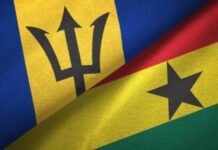
By Ernest KISSIEDU
Exactly a week ago today, news flashed and tongues began rolling up and down the jaws of Ghanaians. It was a matter akin to the 2001 twin tower bombings in the United States of America. Simply, shocking!
The state-backed GCB Bank had swallowed two private banks with staff strength in the region of 990 – UT and Capital banks.
The Bank of Ghana, in a statement, described the take over as: “a Purchase and Assumption transaction with GCB Bank Ltd that transfers all deposits and selected assets of UT Bank Ltd and Capital Bank Ltd to GCB Bank Ltd.”
BoG indicated that it had revoked the Licenses of UT Bank and Capital Bank Ltd as a result of severe impairment of their capital.
According to BoG, the remaining assets and liabilities will be realised and settled respectively through a receivership process to be undertaken by Messers Vish Ashiagbor and Eric Nana Nipah of PricewaterhouseCoopers (PwC).
And so, for an entire week, analysts, experts, politicians, doctors, activists, unionists, laymen and so on and so forth have not ceased to talk about the GCB Bank’s grand coup – so it has been described – at the least opportunity and on any available platform.
But wait a minute! Is this really a raw deal for the UT and Capital banks’ customers?
A ‘big NO!’ says Dr. Steve Manteaw, Campaign Coordinator for civil society group Integrated Social Development Centre (ISODEC).
“One thing that many people discussing this transaction are not aware of was that the transaction was a bidding process. Other banks had to put in their bids and GCB Bank had the best bid. That, in itself, should speak to the public that the bank has grown and they have become a leader in the financial market, at least one of the leaders in the financial markets in Ghana.”
He opines that customers of the now-defunct banks should be calm and trust GCB to take better care of their monies than their previous service providers did.
He said “…you want a bank that you know has the financial muscles, proven to stand the test of times, then go to the bigger banks like GCB bank. So it is a decision you make and that is why we call it free market economy. Everybody is free to buy from wherever you want.”
Dr. Manteaw then described the financial sector as a very strategic one that every government must make sure they have firm control over.
However, it is not very helpful to allow foreign banks to dominate the financial sector because that is where government can mobilize resources to finance national development.
Long queues
In spite of being the largest bank in terms of branch spread in all the ten regions of Ghana including remote areas, the GCB take over has not been met with the greatest level of enthusiasm. Indeed, one of the immediate anxieties of many customers of the now-defunct UT Bank and Capital Bank is that GCB runs a labouring system.
A lot of customers have had to criticize the bank’s poor customer service in terms of delays at the bank, standing in long queues and the issue of bad network which makes it difficult to bank.
Take the new GCB Bank Kasoa Branch, for instance. There are limited seats for customers to afford them a peaceful banking atmosphere. They only have two three-in-one seats which provide sitting space for just six customers. Many of these customers are normally seen sitting on the floor of the forecourt of the bank.
The situation is worse when it gets to the end of the month and government workers especially have to queue just to make withdrawals of their monthly salaries. Queues at the various GCB Bank’s ATMs can also be depressing.
These happenings are not only at the Kasoa branch but at other branches as well.
It is in this light that the bank has been called on to improve its customer service delivery and create a friendlier and an enabling environment for customers to bank with ease.
Dr. Manteaw agrees that the management of GCB Bank must take note of the concerns raised by its customers towards providing quality customer service.
This, according to him, will help to enhance the share values of the bank on the Ghana Stock Exchange (GES).
Dr. Manteaw told Business Day that Ghanaians become oblivious of the fact that to improve the quality of service, it requires investments.
“It requires the introduction of technology and further investment into human resources. As the bank’s business grows, as they acquire more businesses; they are able to marshal the needed resources to undertake the necessary investment to bring about efficiency.
“The more we continue to give our money to foreign companies and deny indigenous companies of making profits out of our money, the weaker our companies become in competing and improving services,” the ISODEC Campaign Coordinator acknowledged.
For Dr. Manteaw, although the smaller banks have speed, are very efficient and do not have long queues at their banking halls; they cannot be compared to the customer base of GCB Bank.
“These smaller banks don’t have many customers to serve. There are fewer customers. But with GCB bank, almost all government pensioners are on its client base. That itself presents a challenge. So if you want speed, you can go and bank with the smaller banks but be careful that you are being also faced with the kind of risk now customers of Capital bank and UT bank are facing today.”
BoG’s announcement
On Monday 14th August, 2017 the BoG announced that it had approved the transaction, indicating that the main offices and branches of UT Bank and Capital Bank will be under the control of GCB bank.
“Customers of UT Bank and Capital Bank are now customers of GCB bank. All deposit customers will continue to have access to their funds. UT Bank and Capital Bank branches and ATMs will continue to operate as normal as GCB bank branches and ATMs. All staff in the interim will become staff of GCB bank and GCB Bank will negotiate the terms of their contract.
“GCB was selected amongst 3 others on the basis of purchase price, cost of funding, branches to be retained, staff to be employed and impact on the acquiring bank’s capital adequacy ratio.
“The approval by the Bank of Ghana of this transaction is to strengthen Ghana’s banking sector, ensure financial stability and protect depositors’ funds.”
The BoG also reassured customers of UT Bank and Capital Bank that their money was safe and they could continue to do business at their respective branches which were now the branches of GCB Bank.
Possible job losses
In addition, the Bank of Ghana had hinted some possible job losses at the collapsed banks, UT and Capital Banks as GCB Bank rolls out its restructuring process, after acquiring them.
There is a fear that some of the over 900 staff of the two banks will be laid off following the transaction.
BoG had said the decision on the number of employees to be retained at the two banks rests with the consolidator.
“For the first three months up to six months, GCB Bank are retaining all branches and they will manage all the staff. Things might change after that.”
No compensation
The Bank of Ghana has indicated that the shareholders of Capital Bank will not be compensated.
According to Head of Banking Supervision of BoG, Raymond Amanfu, discussions with the Ghana Stock Exchange in the coming days will determine the way forward for persons or organisations who bought shares of UT Bank on the stocks.
About Capital Bank
– Founded 29th October 2009 as a microfinance company.
– Became First Capital Plus Savings and Loans Company
– In 2010, the microfinance grew its deposit base to GHc 36.06million and total asset of 47.18million.
– As at the time they were Savings and Loans company, they had 16% of the advances of savings and loans companies and 19% of the sector total assets.
– They got provisional universal banking license in July 2012.
– After 6 months provisional period, they were awarded full license on 4th December 2013 and became officially known as First Capital Plus Bank.
– Rebranded to Capital Bank in 2015 (their rebranding was one of the best executed re-branding campaigns in Ghana).
About UT Bank
– Co-Founded by Joseph Nsonamoah and Prince Kofi Amoabeng in 1997 as Unique Trust Financial Services – a Non-Bank Financial Services Provider
– Over time, it acquired subsidiaries and was later listed on the Ghana Stock Exchange under the holding company, UT Holdings Limited.
– In 2008, UT Holdings Limited acquired major shareholding in a Ghanaian commercial bank called BPI Bank.
– Bank was later rebranded as UT Bank and opened for business in May 2009.
– In June 2010, UT Bank and UT Financial Services merged into a new company called UT Bank Ghana Limited.
– It traded on the GSE under the symbol: UTB.
– Revenue: GHs 13.1 Million – 2011
– Total Assets: GHs 712.9 Million


























